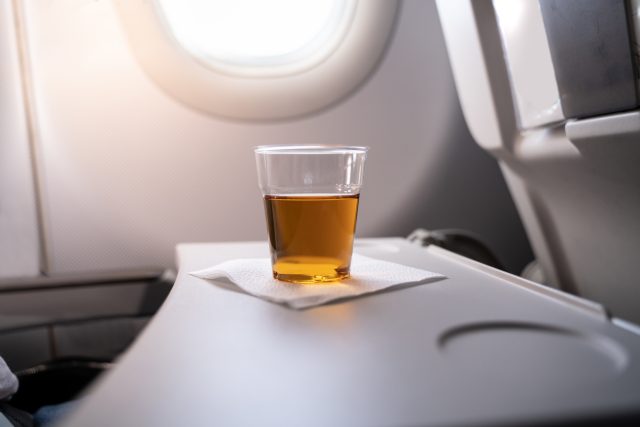Does drinking on planes help or hinder sleep?
While many of us look forward to enjoying a glass of something before dozing off on a long flight, the combination of alcohol and altitude could negatively affect sleep, according to new research.

The study, published in respiratory medicine journal Thorax, was authored by Dr. Eva-Maria Elmenhorst of the Institute of Aerospace Medicine in Cologne.
Two groups (totalling 48 people overall) of healthy individuals spent two nights either in a sleep laboratory just above sea level, or in an altitude chamber that simulated the hypobaric (low Oxygen) conditions 2,438 metres above sea level, with both consuming alcohol before one of the nights to bring them to 0.06% blood alcohol concentration (BAC).
“Alcohol acts as a potent somnogen which leads to a reduced sleep onset latency and rapid eye movement (REM) sleep duration, and may result in cognitive impairment, difficulties in concentration and memory disorder. The alcohol-induced systemic vasodilatation increases heart rate during sleep,” wrote Elmenhorst. “Hypobaric hypoxia leads to a shortened N3 and REM sleep duration and decreased SpO2 during sleep while the heart rate is increased. We hypothesised that the combination of alcohol and hypobaric conditions would exacerbate the changes in sleep observed under single exposure conditions.”
The results revealed that drinking at altitude caused otherwise healthy participants to experience “clinically relevant desaturations” of Oxygen and “heart rate accelerations” while sleeping.
Partner Content
Class concerns
Elmenhorst also noted that the in-flight experience, and therefore passengers’ response to alcohol, would vary – with those splashing out on a first or business class ticket actually apparently more at risk of a bad kip.
“Sleeping in a sitting position has been reported to impair sleep efficiency and REM duration. Following the notion that hypobaric hypoxia is aggravated by sleep, passengers travelling in economy class might be affected to a lesser extent by the exposure to alcohol and hypobaric conditions. The free access of first and business class passengers to alcoholic beverages might increase the risk.”
“Our findings support the recommendations of the BTS [British Thoracic Society] Clinical Statement on Air Travel to avoid alcohol in the 12 hours preceding and during air travel when suffering from obstructive sleep apnea syndrome or obesity hypoventilation syndrome,” she concluded.
Despite this advice, many airlines are working on improving their drinks offering, with Air France recently appointing a new head sommelier. For those of us who cannot sleep on planes anyway, the findings of the study may not affect our decision to enjoy something from the trolley – given that altitude does hinder our tastebuds, it is difficult to find a tipple that is actually improved up in the air, but there is one…
Related news
Why are young people drinking less wine?




